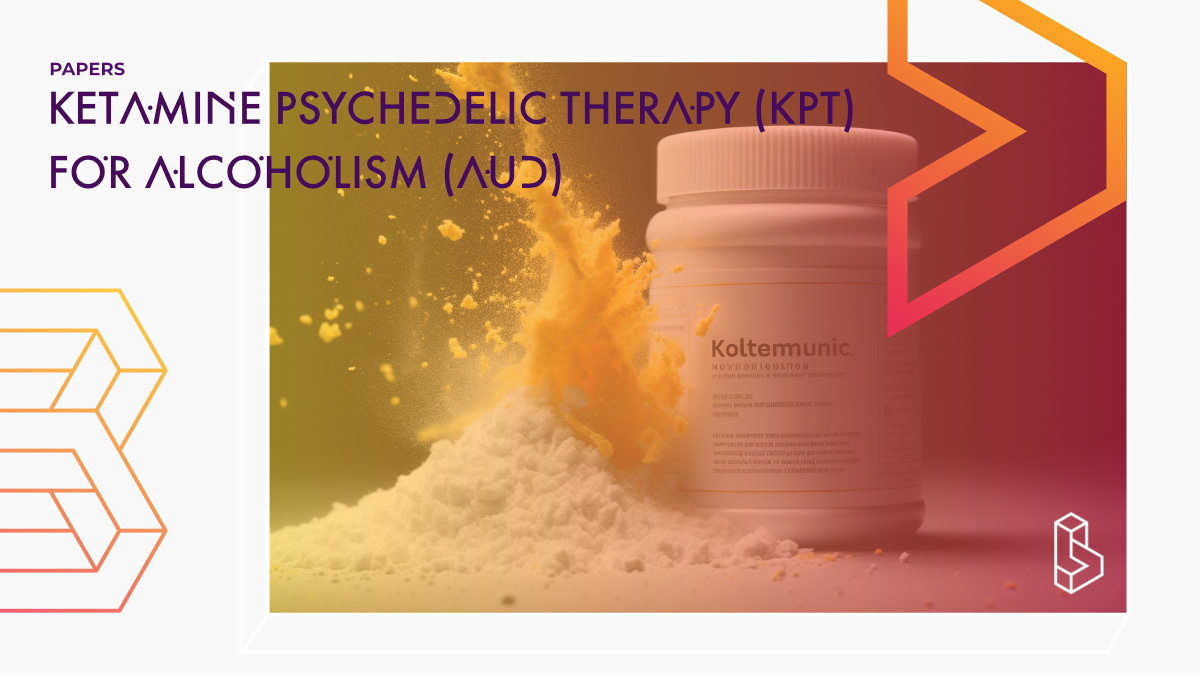This review (1997) suggests that ketamine psychedelic therapy (KPT) could effectively treat alcoholism (AUD). Total abstinence at one year compared favourably (65.8% to 24%) to a group receiving conventional treatment.
Abstract of Ketamine psychedelic therapy (KPT) for Alcoholism (AUD)
“Ketamine is a prescription drug used for general anesthesia. In subanesthetic doses, it induces profound psychedelic experiences and hallucinations. The subanesthetic effect of ketamine was the hypothesized therapeutic mechanism in the authors’ use of ketamine-assisted psychotherapy for alcoholism. The results of a controlled clinical trial demonstrated a considerable increase in efficacy of the authors’ standard alcoholism treatment when supplemented by ketamine psychedelic therapy (KPT). Total abstinence for more than one year was observed in 73 out of 111 (65.8%) alcoholic patients in the KPT group, compared to 24% (24 out of 100 patients) of the conventional treatment control group (p<0.01). The authors’ studies of the underlying psychological mechanisms of KPT have indicated that ketamine-assisted psychedelic therapy of alcoholic patients induces a harmonization of the Minnesota Multiphasic Personality Inventory (MMPI) personality profile, positive transformation of non verbalized (mostly unconscious) self-concept and emotional attitudes to various aspects of self and other people, positive changes in life values and purposes. important insights into the meaning of life and an increase in the level of spiritual development. Most importantly, these psychological changes were shown to favor a sober lifestyle. The data from biochemical investigations showed that the pharmacological action of KPT affects both monoaminergic and opioidergic neurotransmitter metabolism, i.e., those neurochemical systems which are involved in the pathogenesis of alcohol dependence. The data from EEG computer-assisted analysis demonstrated that ketamine increases theta activity in cerebrocortical regions of alcoholic patients. This is evidence of the reinforcement of limbic cortex interaction during the KPT session.”
Authors: Evgeny M. Krupitsky & Alexander Y. Grinenko
Summary of Ketamine psychedelic therapy (KPT) of alcoholism (AUD)
Ketarnine, a prescription drug used for general anaesthesia, induces profound psychedelic experiences and hallucinations. Ketamine-assisted psychotherapy for alcoholism increases the efficacy of standard alcoholism treatment when supplemented by ketamine psychedelic therapy, and results in total abstinence for more than one year in 73 out of 73 patients.
The psychedelic experience may have beneficial effects in many ways, including enhancing personal growth and self awareness.
Ketamine, an anaesthetic agent, was shown to induce a profound psychedelic experience in patients, and was utilized for therapeutic purposes in ketamine-assisted therapy for alcoholism. Ketamine is safe and short-acting and is already a prescription drug.
Find this paper
Ketamine psychedelic therapy (KPT): a review of the results of ten years of research
https://doi.org/10.1080/02791072.1997.10400185
Paywall | Google Scholar | Backup | 🕊
Cite this paper (APA)
Krupitsky, E. M., & Grinenko, A. Y. (1997). Ketamine psychedelic therapy (KPT): a review of the results of ten years of research. Journal of psychoactive drugs, 29(2), 165-183.
Study details
Compounds studied
Ketamine
Topics studied
Addiction
Alcohol Use Disorder
Study characteristics
Literature Review
Participants
211
Humans

